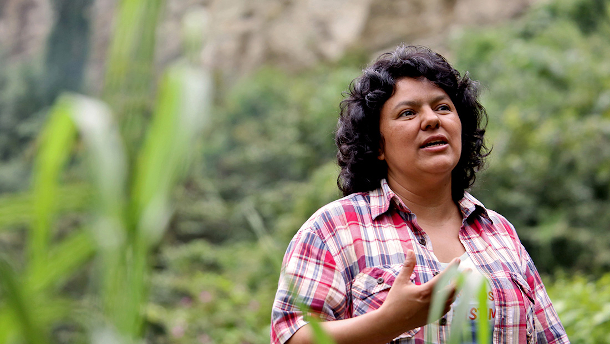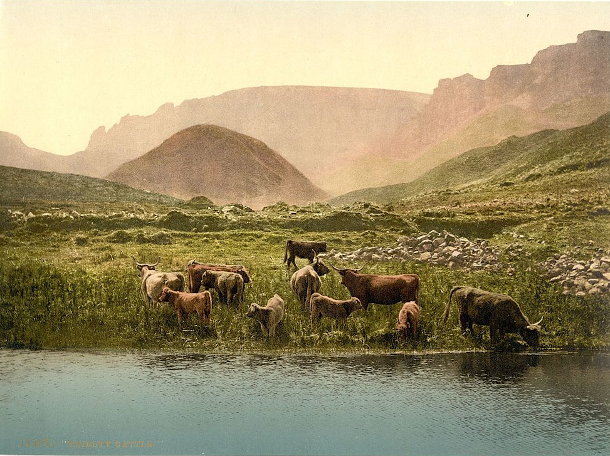Broadcast date: week of July 16, 2021
flux/ download this segment as an MP3 file
Allergies in our warming world are not to be sneezed at. (Photo: Pixel Rich on Unsplash)
Allergies in our warming world are not to be sneezed at, Environmental Health News’ Peter Dykstra told host Steve Curwood in this week’s Beyond the Headlines segment. Also, a glimmer of justice for the slain indigenous environmentalist Berta Cáceres, and in the historical calendar, a throwback of nearly 200 years on a historic animal cruelty law in Britain.
Transcription
CURWOOD: This is Living on Earth, I’m Steve Curwood.
And now is the time to take a look beyond the headlines with Peter Dykstra. Peter is editor-in-chief for Environmental Health News, ie EHN.org and DailyClimate.org. He’s online from Atlanta, Georgia. How are you, Pierre? How do you like the summer heat?
DYKSTRA: Oh, summer is fine. It is currently thunder storm here in beautiful Atlanta. But there’s an element of heat and drought and potential wildfire season, all of the things plaguing the western United States right now. It turns out that in the desert all this creates a terrible allergy season.
CURWOOD: Whoa, whoa, whoa, are allergies linked to drought and all this climate change? How? ‘Or’ What?
DYKSTRA: Yeah, when you have a practically snowless winter, very little rain, amazing heat and everything in between, people with allergies, like me, really have a hard time because the pollen stays in the air. ; we’re talking grass pollen, pine pollen, maybe even ragweed from last fall, staying in the air forever. And the desert can be an absolutely hellish place for allergy sufferers like me.
CURWOOD: Okay, well, there’s something else to think about with the climate: you might not have water, you might have to deal with fires, you might have storm surges. and you sneeze a lot. OK, Peter, hey, what else do you have for us?
DYKSTRA: Something we’ve talked about a lot over the past five or six years, the killings of activists in developing countries trying to protect the environment, the most famous of which was Berta Cáceres, she won the Goldman Prize in 2015 for his work against a hydroelectric dam project in his native Honduras. A year later, she was murdered. Eventually, seven people were arrested and convicted of the murder. But just in the last few weeks, Roberto David Castillo – a former US-trained Honduran military intelligence officer and also head of the power company that was building the dam – was found guilty as a co- collaborator in the order of the murder of Berta Caceres. And if you love justice and protect very, very courageous people, that’s good news.

The murder of Berta Cáceres has drawn worldwide attention to the rampant killings of environmental activists and land defenders. At least 212 were killed in 2019, according to Global Witness. (Photo: Goldman Environmental Prize)
CURWOOD Sure, now people can be sentenced, but what kind of punishment? I mean, is this guy going to just do a little community service and walk, or what’s up?
DYKSTRA: We’ll find out in early August when he’s sentenced. The maximum penalty varies between 24 and 30 years.
CURWOOD: Ok, Peter, hey, let’s take a look at the story now and tell me what you’re looking at and what you see.
DYKSTRA: July 22, 1822, when many of your listeners were not alive. It was one of the first laws governing the treatment of animals. The British Parliament passed what has been called the Martin Law.

In 1822, the British Parliament passed the Martin’s Act, which prohibited the cruel treatment of cows, horses, oxen, mules and sheep. (Photo: Library of Congress, public domain)
CURWOOD: And I guess that time was also a time of reform, what else did they do in terms of taking care of the environment and things?
DYKSTRA: Well, thanks to famous Brits like the poet Wordsworth and the scientist Michael Faraday, they were actually the first to raise the hell out of the environmental conditions in London, the burning of coal; suffocating pollution, sometimes fatal; and also the smell of the Thames. There were the first attempts to regulate air and water pollution. These laws did not go far; the river was still dirty, the air was still dirty and sometimes deadly. But Britain has taken some of the first steps to tackle some of the worst problems.
CURWOOD: Hey, Peter, thank you very much for taking the time with us today. Peter Dykstra is editor-in-chief for Environmental Health News, ie EHN.org and DailyClimate.org. We will get back to you very soon.
DYKSTRA: Okay, Steve, thank you very much. See you soon.
CURWOOD: And there’s more to those stories on the Living on Earth webpage. This is LOE.org.
Connections
Salt Lake City Grandstand | “Another side effect of the Utah drought: a terrible allergy season”
Hear LOE’s coverage of the murder of Berta Cáceres and other environmental activists
About the Martin law, the “Cruel Treatment of Cattle Act 1822”
Living on Earth wants to hear from you!
P.O. Box 990007
Prudential Post
Boston, Massachusetts, VS 02199
Phone: 1-617-287-4121
Email: [email protected]
Donate to Living on Earth!
Living on Earth is an independent media program and relies entirely on contributions from listeners and institutions supporting public service. Please donate now to maintain an independent environmental voice.
Bulletin/> Vivre sur Terre offers weekly delivery of the summary of the program to your mailbox. Sign up for our newsletter today!
 Sailors for the sea: Be the change you want to see the sea.
Sailors for the sea: Be the change you want to see the sea.
 Create positive results for future generations.
Create positive results for future generations.
 Innovate to make the world a better and more sustainable place to live. Hear the 9 billion race
Innovate to make the world a better and more sustainable place to live. Hear the 9 billion race
 The Grantham Foundation for environmental protection: Committed to protecting and improving the health of the global environment.
The Grantham Foundation for environmental protection: Committed to protecting and improving the health of the global environment.
 Energy Foundation: Serve the public interest by helping to build a strong and clean energy economy.
Energy Foundation: Serve the public interest by helping to build a strong and clean energy economy.
 To contribute to Live on Earth and receive, as a gift for you, an archival copy of one of Mark Seth Lender’s works extraordinary wildlife photographs. Follow the link to view Mark’s current collection of photographs.
To contribute to Live on Earth and receive, as a gift for you, an archival copy of one of Mark Seth Lender’s works extraordinary wildlife photographs. Follow the link to view Mark’s current collection of photographs.
 Buy a signed copy of Mark Seth Lender’s book Smeagull the seagull & support Living on Earth
Buy a signed copy of Mark Seth Lender’s book Smeagull the seagull & support Living on Earth
 Xoven Agricultor
Xoven Agricultor



